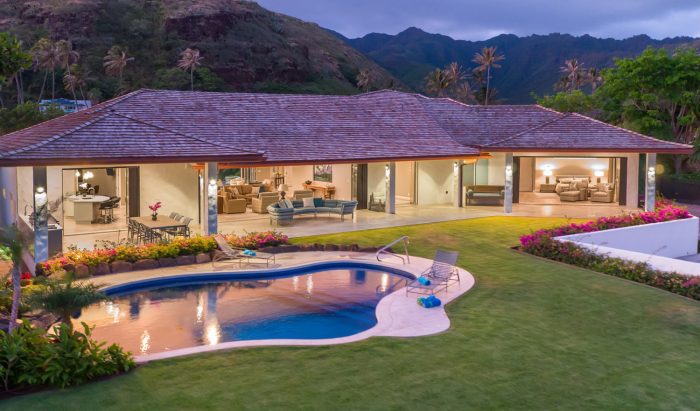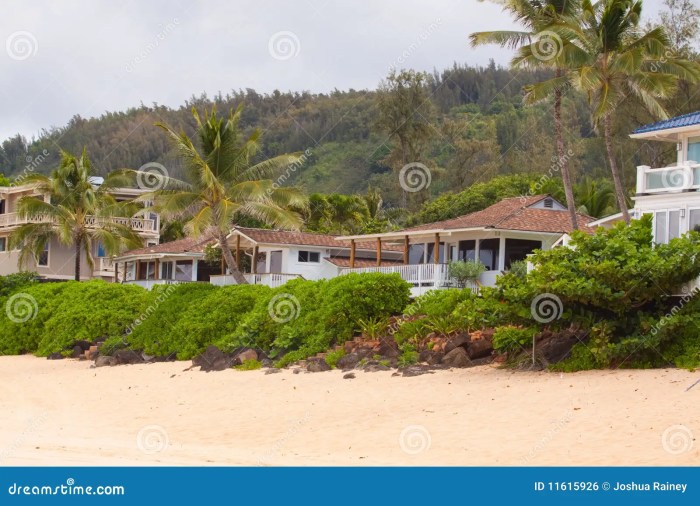Houses to Rent in Hawaii Your Island Escape Awaits
Hawaii Rental Market Overview
Houses to rent in hawaii – The Hawaiian rental market is characterized by high demand and limited supply, resulting in competitive rental rates across all islands. This dynamic is significantly influenced by tourism, seasonal fluctuations, and the overall desirability of living in Hawaii. Understanding the current market conditions is crucial for prospective renters.
Current State of the Hawaii Rental Market
Hawaii consistently faces a housing shortage, driving up rental costs. Demand significantly outweighs supply, particularly for desirable properties in popular areas. This imbalance creates a competitive landscape for renters, often necessitating quick decision-making and potentially higher upfront costs.
Average Rental Costs Across Hawaiian Islands

Source: tripadvisor.com
Rental costs vary considerably across the different Hawaiian islands. Honolulu, on Oahu, generally commands the highest prices, followed by Maui and Kauai. The Big Island tends to have more affordable options, although prices vary significantly depending on location and property type.
Popular Rental Areas in Hawaii

Source: hawaiihome.me
Areas like Waikiki (Oahu), Kaanapali (Maui), Poipu (Kauai), and Kona (Big Island) are highly sought-after due to their proximity to beaches, amenities, and attractions. These locations often come with premium rental prices reflecting their desirability.
Rental Cost Comparison Table
| Location | Studio | 1-Bedroom | 2-Bedroom | 3+ Bedroom |
|---|---|---|---|---|
| Honolulu | $1800 – $3000 | $2500 – $4500 | $3500 – $6000 | $5000+ |
| Maui | $1500 – $2500 | $2000 – $4000 | $3000 – $5000 | $4500+ |
| Kauai | $1600 – $2800 | $2200 – $4200 | $3200 – $5500 | $4800+ |
| Big Island | $1200 – $2000 | $1500 – $3000 | $2000 – $4000 | $3000+ |
Types of Rental Properties Available
The Hawaiian rental market offers a diverse range of property types, catering to various needs and budgets. Understanding the characteristics and amenities of each type is crucial for making an informed decision.
Types of Rental Properties and Their Characteristics
- Apartments: Typically found in multi-unit buildings, apartments offer convenience and often include amenities like swimming pools and laundry facilities. They can range from studios to larger units.
- Condos: Similar to apartments but often more upscale, condos frequently offer owner-managed amenities and a more private feel. They may also have access to shared facilities like gyms or tennis courts.
- Houses: Offer greater privacy and space than apartments or condos. They may include yards, garages, and more amenities. Rental houses are less common than apartments or condos.
- Townhouses: Combine the privacy of a house with the convenience of a condo or apartment. They typically share a common wall with neighboring units but often have private yards or patios.
- Vacation Rentals: Short-term rentals, often furnished and equipped for immediate occupancy. They provide flexibility but may not offer the same amenities or long-term stability as other rental types.
Factors Influencing Rental Prices
Several factors contribute to the variation in rental prices across Hawaii. Understanding these factors is key to finding a property that aligns with your budget and preferences.
Key Factors Affecting Rental Prices
Location is the most significant factor, with properties in prime areas commanding higher rents. Size, amenities (e.g., ocean views, updated appliances), and the season (higher during peak tourist seasons) also play crucial roles. The impact of tourism is substantial, driving up demand and prices, especially in popular tourist destinations.
Neighborhood Price Comparison
Even within the same island, rental prices can differ significantly between neighborhoods. For example, areas closer to beaches or with better schools will generally have higher rental costs compared to more inland or less developed areas.
Impact of Tourism on Rental Costs
The tourism industry heavily influences rental prices, particularly in areas with high tourist traffic. Demand surges during peak seasons, pushing rental rates upward. This seasonal variation is a significant consideration for prospective renters.
Factors Influencing Rental Price Table
| Factor | Impact on Price | Example |
|---|---|---|
| Location | Significant positive correlation | Oceanfront property vs. inland property |
| Size | Positive correlation | 3-bedroom house vs. studio apartment |
| Amenities | Positive correlation | Property with pool vs. property without |
| Season | Seasonal fluctuation | Higher prices during summer months |
Finding Rental Properties in Hawaii
Finding a rental property in Hawaii requires a strategic approach. Utilizing multiple methods increases your chances of success. The process itself involves several steps, from searching to signing a lease.
Methods for Finding Rental Properties
- Online Real Estate Portals: Websites like Zillow, Trulia, and Craigslist offer extensive listings but may require careful vetting to avoid scams.
- Local Real Estate Agents: Agents possess in-depth market knowledge and can provide personalized assistance, although their services may involve fees.
- Word-of-Mouth: Networking within your social circles can uncover hidden opportunities, but this method relies on chance encounters.
Steps in the Rental Process
- Search for Properties: Utilize online portals, agents, or networking to find potential rentals.
- Schedule Viewings: Visit properties to assess their suitability and condition.
- Submit an Application: Complete rental applications, providing necessary documentation (e.g., income verification).
- Background Check: Undergo background and credit checks.
- Negotiate Terms: Discuss rental terms and conditions with the landlord.
- Sign Lease Agreement: Review and sign the lease agreement carefully.
- Pay Security Deposit and First Month’s Rent: Complete the financial transactions as Artikeld in the lease.
Legal and Practical Considerations
Navigating the legal aspects of renting in Hawaii is crucial to protect your rights and avoid potential problems. Understanding tenant rights, landlord responsibilities, and common scams is essential.
Important Legal Considerations
Hawaii has specific tenant rights and landlord responsibilities Artikeld in state law. Familiarize yourself with these laws to understand your protections and obligations. Thoroughly review lease agreements before signing to ensure you understand all terms and conditions.
Avoiding Rental Scams
Be wary of overly low prices, requests for payment before viewing a property, or landlords who are unwilling to meet in person. Always verify the landlord’s identity and property ownership before making any payments.
Negotiating Rental Terms
Negotiating rental terms can be possible, especially in a less competitive market. Be prepared to discuss rent, lease length, and other conditions. Maintain respectful communication and a professional approach throughout the negotiation.
Resolving Rental Disputes
If disputes arise, attempt to resolve them amicably with the landlord. If this fails, explore mediation or legal action as appropriate, following the procedures Artikeld in your lease agreement and Hawaiian law.
Lifestyle and Community Aspects
The lifestyle associated with renting in Hawaii varies greatly depending on location and community. Consider the unique characteristics of different areas when choosing a rental property.
Lifestyle and Community Descriptions
Living in Waikiki offers a vibrant, tourist-centric lifestyle with easy access to beaches and entertainment. However, it can be crowded and more expensive. Conversely, renting in a quieter, more residential area might provide a more tranquil experience but potentially less convenient access to amenities.
Community Events and Activities
Many Hawaiian communities offer various events and activities for residents, including farmers’ markets, festivals, and outdoor recreation opportunities. Research the specific events and activities available in your potential rental area.
Unique Aspects of Hawaiian Communities
The unique aspects of Hawaiian communities vary widely. Some areas prioritize outdoor recreation, while others focus on arts and culture. Consider your personal preferences and lifestyle when selecting a rental location.
Illustrative Examples of Rental Properties

Source: dreamstime.com
These descriptions illustrate the variety of rental properties available in Hawaii. Remember that actual properties and their features will vary.
Property Example 1
A cozy studio apartment in a quiet residential neighborhood on Kauai. The apartment features a fully equipped kitchenette, a lanai with garden views, and access to a shared swimming pool. The surrounding area is peaceful and offers easy access to hiking trails and scenic coastal walks.
Property Example 2
A spacious two-bedroom condo in a luxury complex in Kaanapali, Maui. The condo boasts stunning ocean views, a private lanai, and access to resort amenities including a pool, fitness center, and tennis courts. The location is ideal for those who enjoy upscale amenities and beachfront living.
Finding the perfect rental in Hawaii can be a delightful but challenging process, depending on your budget and desired location. If you’re considering options further inland, you might explore alternatives like those available in Louisiana; for example, check out the listings for houses in Natchitoches LA for rent to compare pricing and styles. Ultimately, the ideal rental will depend on individual preferences, but exploring diverse locations can be beneficial.
Property Example 3, Houses to rent in hawaii
A charming three-bedroom house situated on a large lot in a rural area of the Big Island. The house features a large kitchen, a spacious living area, and a lush tropical garden. The surrounding environment is peaceful and provides opportunities for outdoor activities such as hiking and exploring nearby volcanic landscapes.
FAQ Insights: Houses To Rent In Hawaii
What is the typical lease term for rentals in Hawaii?
Lease terms vary, but one-year leases are common. Shorter-term rentals are also available, especially in tourist areas, but often come with higher prices.
How much is a security deposit typically?
Security deposits usually range from one to two months’ rent, depending on the property and landlord.
Are utilities included in rent?
Utilities are rarely included in rent. Expect to pay separately for electricity, water, internet, and other services.
What are the pet policies like?
Pet policies vary greatly. Some properties allow pets with additional fees and restrictions, while others have strict “no pets” policies. Always inquire beforehand.




















